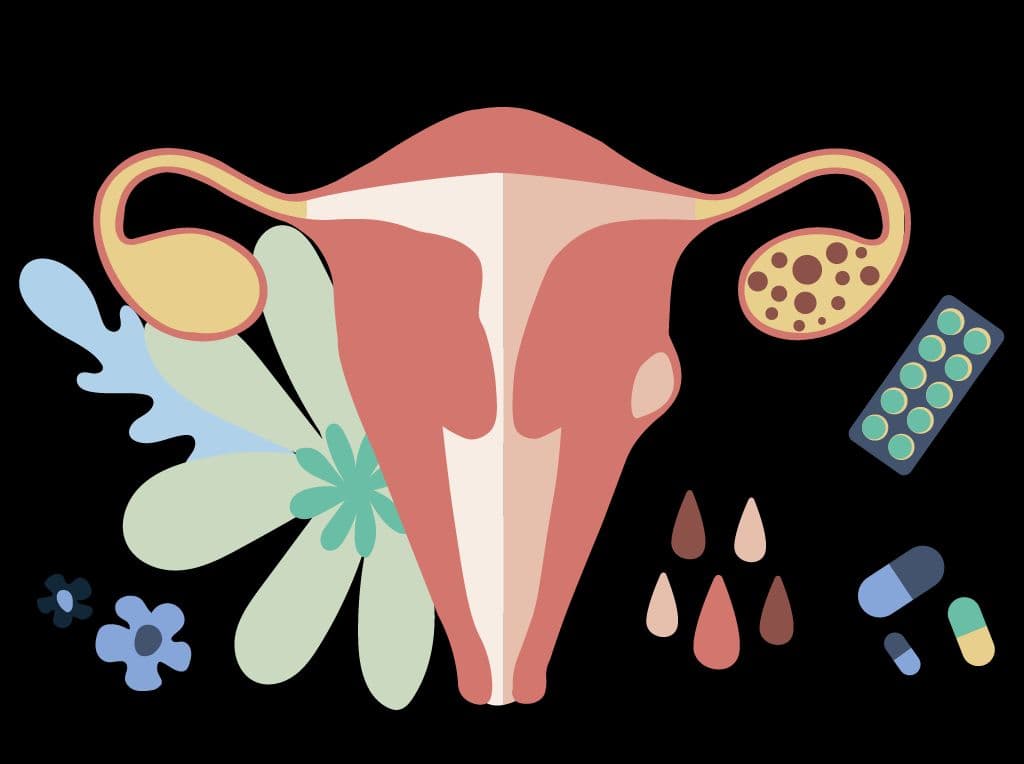This article has been compiled by Vaibhavi Kodnani, a content writer at Proactive For Her.
PCOS is a hormonal disorder affecting women of the reproductive age group. Persons with PCOS often have imbalances in the levels of reproductive hormones such as FSH, LH, estrogen and progesterone and a surge in the levels of androgens (masculinising hormones in our bodies). These imbalances contribute to various skin changes.
PCOS can cause the following skin problems:
Hormonal acne
You may develop hormonal acne around the lower part of the face such as jawline, chin, lips and upper neck. The acne can be in the form of pustules and blackheads. It could also be nodular or cystic acne - a serious type of acne that is extremely painful.
Hirsutism
Hirsutism refers to excessive hair growth on different parts of your body. You may develop hair on the lower part of your face like the upper lip and chin. The length and thickness of your sidelocks may increase. Apart from this, you may also observe increased hair growth on your body, especially on the chest, back or around the navel.
Pigmentation
High insulin levels in the body can lead to acanthosis nigricans that means hyperpigmentation of the skin. In this condition, your skin will darken and become leathery or thick in texture. It can occur on the nape of your neck, underarms and inner thighs.
Hair fall
As PCOS leads to a hyperandrogenic state, it can cause androgenetic alopecia, i.e. hormonal hair fall. You will observe central baldness, i.e. your hairline will recede.

What are the medical treatment options available for skin problems?
The treatment for PCOS and the skin disorders related to PCOS go hand in hand. Hence, visit a gynaecologist as well as a dermatologist. Your PCOS treatment plan will depend on the root cause of your condition. However, to manage the skin issues, your dermatologist will suggest a combination of medications, lifestyle modifications and a daily skincare routine to follow.

What are the lifestyle modifications for skin issues due to PCOS?
You cannot completely depend on medical treatments for managing your skin issues. Adapting crucial lifestyle changes will also aid your healing process.
De-stress
PCOS can cause a lot of physical and mental stress. You may suffer from frequent mood swings that can affect the quality of your daily life. Being stressed all the time can result in breakouts on your face and hair fall too. Hence, manage stress to prevent its effects on your skin and hair. There are many techniques available that can help you calm your nerves like meditation and yoga to name a few. Remove some time for yourself daily to practice something you love.
Eat healthy
Eating a healthy and nutritious diet will make an immense difference. What you eat does matter and following these simple diet guidelines will bring life-changing differences if you are suffering from PCOS.
- Eat clean, fresh and home-cooked meals.
- Eat at least three wholesome meals on time.
- Do not take to fancy dieting.
- Avoid sugary items.
- Avoid refined flour products.
- Avoid using animal-based milk. You can have milk products such as cheese, curd, etc. If you wish to have milk products such as tea or coffee, use plant-based milk like almond milk or soy milk.
There is a simple home remedy that seems to have worked well for managing PCOS in some persons. It helps to regularise the hormones and manage premenstrual symptoms like breast pain and period cramps.
- Take two petals of saffron and boil them in one glass of water.
- Drink it on an empty stomach every single day.
Sleep
Getting at least 7-8 hours of uninterrupted, sound sleep is crucial if you have skin issues related to PCOS. When you sleep, your body gets enough time to recover. You will also feel fresh and less stressed the next day. You must sleep at least by 11 PM every night.
Exercise
75% of women having PCOS struggle with weight gain. Therefore, if you exercise regularly to manage your weight, it can help you manage other PCOS symptoms as well. Experts recommend doing 20 minutes of strengthening exercises, cardio exercises or power yoga daily.
Stay away from plastic and pollution
Recent research has found an association between PCOS, plastic and pollution. Hence, it is advisable to switch to non-plastic products. Instead of plastic water bottles or tiffins, you can opt for steel or copper utensils. Handling pollution may not be in your hands, but you can try simple tricks to breathe fresh air. Some ideas are more plantations around your house or going to a park to exercise.
What is the best skincare routine and tips for PCOS related skin issues?
Skincare should be a part of your daily routine. You should have a day and night skincare routine to manage your skin problems. Incorporating these small changes would make a lot of difference to your skin.
- Wash your face at least twice a day. You can wash it a maximum of three times but not more than that.
- Keep in mind the timing whenever you wash your face. The whole act of application of face wash and washing your face should be within 30 seconds. Overwashing can strip off natural oils and make your face irritated.
- After using the face wash, wipe off your face with clean tissue paper. Do not use Turkish or cotton towels on your face.
- If you work out, wash your hair and face post-workout. You can even do that if you sweat a lot in general.
- Apply sunscreen during the day but not at night.
- If you apply makeup, make sure to remove it before going to sleep.
- Keep your makeup tools clean at all times.
- Change your pillowcases after every two days because they are a hub for dust, oil secretion, etc. Remember to flip your pillows to the other side after a single use.
- Sanitise your phone regularly as it is in constant contact with your face if you do not use headphones.
- Wearing masks all the time can worsen your acne. Therefore, you must wear disposable masks. You can even choose to wear cotton masks provided you can wash them after every use. Also, give yourself a 10-15 mins mask free period after every 2 hours.
- Drink at least 2 litres of water every day. The more you drink, the better for you. Keeping yourself well hydrated will help to detoxify your skin and reduce acne.
- Whenever you buy a product on your own, always make sure they are dry touch, non-comedogenic and hypoallergenic.
Below are some tips to help you choose the right products:
- If you have oily skin, start using a salicylic acid-based face wash.
- If you have acne, go to a dermatologist who will prescribe you medicines. You can even use benzoyl peroxide 2.5% gel to treat acne.
- Use a good, medicated sunscreen that has SPF 30 and above with PA++, PA+++ or PA++++.
- If you are not suffering from acne, you can use a retinol night cream and a Vitamin C in your daycare along with your sunscreen.
Here are a few don’ts to remember if you have skin problems.
- Do not self-diagnose; always consult a dermatologist.
- Do not keep switching products, have patience.
How to choose the right makeup products?
The kind of makeup products will depend on your skin type.
If you have oily skin
- Opt for fluid or gel-based products.
- Choose a foundation that is dry touch, silicone-free and produces less oil. You can do a tissue paper test to find out if the product has oil or not. For that, apply some product on tissue paper and leave it for an hour. If it has oil, it will transfer on the tissue paper.
- Do not apply a thick layer of foundation to prevent clogging of pores.
- For everyday makeup, use tinted creams, BB creams or tinted sunscreen.
- Remember to buy makeup products that are dry touch, non-comedogenic and hypoallergenic.
If you have dry skin
- Opt for hydration products or those which have a creamy or milky consistency.
Apart from these points, always apply for your acne medicines before doing makeup. Do not do heavy layering of makeup; keep it light. Wear disposable masks if they are mandatory for you to wear over your makeup.
Recommended brands of skincare products
Below are a few brands hand-picked by our skincare expert. You can choose products of these brands depending on your skin type.
- Sesderma
- Dermaceutic
- Bioderma
Bottom line
If you have PCOS, remember that it is normal to have pcos skincare problems. Gather as much information as you can to understand your condition. PCOS has no cure, but it is a manageable condition. Along with the prescribed medications, adopting a healthy lifestyle, diet habits, and skincare routine are equally important.
Disclaimer : This information is provided for educational purposes and should not be construed as medical advice. Please consult with your healthcare practitioners before undertaking any changes in your diet or adding supplements.
Proactive For Her is a digital clinic for women, offering accessible, personalized, and confidential health-care solutions. We offer products and services for out-patient health concerns of Indian women, across their lifetime - from puberty to pregnancy to menopause.

